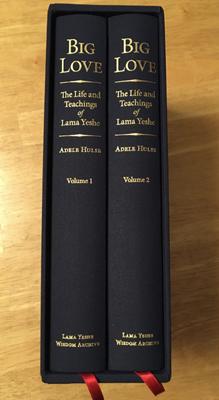Dear Friends,
Welcome to our March 2020 eletter. All of us here at the Archive are grateful to be safe and well during the COVID-19 outbreak, and we hope you are safe and healthy as well. Many of us have seen our lives slow down and simplify, and are taking advantage of the free time to study and practice. If this is the case for you, we invite you to also take advantage of all the resources on our website, to download and read free books, listen to recorded teachings, watch video of the Lamas teaching, and read the thousands of pages of teachings we have posted online. We have also included links to advice and practices from Lama Zopa Rinpoche related to the COVID-19 outbreak below. Please do let us know if there is anything we can do for you.
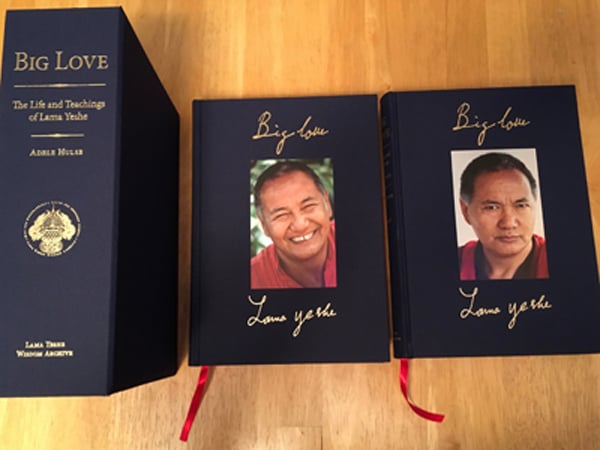 We’d like to update you on the status of Big Love. The books were printed in South Korea and have been ready to ship for over a week. We were planning on sending initial orders to our six distribution points around the world (Boston, Melbourne, Chandrakirti New Zealand, Singapore, IVY France and London) by air, but because of the COVID-19 pandemic many flights have been canceled. As a result, air cargo prices on those that remain have skyrocketed to the point where it is unreasonable to send them that way and we have now arranged shipping by ocean freight. We should have arrival times at each of the six destinations by next week. If you are due to receive a copy we will email you as soon as we know when you can expect it. We very much appreciate your patience. It will be worth the wait!
We’d like to update you on the status of Big Love. The books were printed in South Korea and have been ready to ship for over a week. We were planning on sending initial orders to our six distribution points around the world (Boston, Melbourne, Chandrakirti New Zealand, Singapore, IVY France and London) by air, but because of the COVID-19 pandemic many flights have been canceled. As a result, air cargo prices on those that remain have skyrocketed to the point where it is unreasonable to send them that way and we have now arranged shipping by ocean freight. We should have arrival times at each of the six destinations by next week. If you are due to receive a copy we will email you as soon as we know when you can expect it. We very much appreciate your patience. It will be worth the wait!
In the meantime, take a look at all that is newly available for you on our website, and our YouTube channel, much of which is excerpted from Big Love.
FROM THE VIDEO ARCHIVE: A READING BY BIG LOVE AUTHOR ADELE HULSE
Big Love author Adele Hulse offers a dramatic reading about the beginnings of Chenrezig Institute in Queensland, Australia, and the events surrounding the first Dharma course given there by Lama Yeshe and Lama Zopa Rinpoche in 1975. This excerpt is from Big Love: The Life and Teachings of Lama Yeshe, Volume 1, Chapter 13: "1975: We Need an Organization." See more dramatic readings from Big Love on the LYWA Youtube channel.
Visit and subscribe to the LYWA YouTube channel to view dozens more videos freely available from our archive. See also the FPMT YouTube channel for many more videos of Lama Zopa Rinpoche’s teachings.
What's New On OUr Website
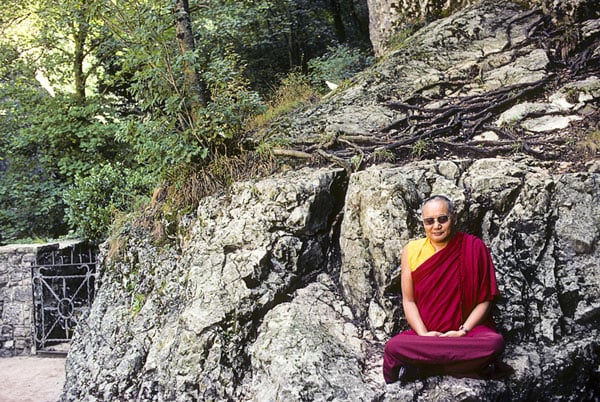 There is an abundance of new teachings on our website this month, to provide you with inspiration and courage during these difficult times.
There is an abundance of new teachings on our website this month, to provide you with inspiration and courage during these difficult times.
We are pleased to share a previously unpublished teaching by Lama Yeshe, The Peaceful Path to Liberation. This extensive teaching on refuge, the five lay precepts, bodhicitta and more, was given at the Sixteenth Kopan Meditation Course in 1983. You can read an excerpt in our e-letter below. This was one of Lama's last teachings before he passed away in 1984 and is described in Big Love:
After three days of rest, Lama Yeshe came into the teaching tent on December 9, climbed up onto the throne and gave a talk on refuge. The students were pretty tense after a month of contemplating their own negative minds, but after just a few words from Lama they began to glow with delight.
Also new this month:
- How to Use Sickness on the Path: In this teaching excerpt, Lama Zopa Rinpoche advises how to experience disease and other problems for all sentient beings.
- Condensed Benefits of the Lotus Pinnacle of Amoghapasha Mantra: The ten benefits of reciting or even seeing, touching or remembering this mantra, translated by Lama Zopa Rinpoche.
We have also posted three more teaching excerpts from Big Love:
- A Simple Explanation of Karma: Lama Yeshe teaches the fundamentals of karma in this teaching given at Manjushri Institute, England, in 1976.
- The True Nature of the Mind: Lama Yeshe discusses the meaning of "buddha" and how to become completely open and free from ignorance, in this short excerpt from a public talk on the four noble truths, given in Tokyo in 1978.
- The Meaning of Dharma: Lama Zopa Rinpoche explains how Dharma provides us with a method to achieve happiness and avoid suffering in this excerpt from a two-week lamrim course held in California in 1977.
Big Love also contains many other teachings by Lama Yeshe and Lama Zopa Rinpoche.
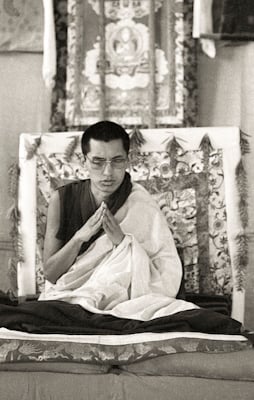
- Overcoming Fear of Death: A student wrote that they had a deep fear of death from an early age and asked Rinpoche how to overcome this fear.
- Essential Practices for Protection from Coronavirus COVID-19: In this letter to a student, Rinpoche recommends practices for protection and healing from COVID-19.
- Seeing Mistakes in the Guru’s Actions: Advice given to a student who had written to Rinpoche about a spiritual teacher accused of misconduct.
- Advice and Practices for Depression and Long Life: Rinpoche wrote this card to a student who was experiencing depression and also had life obstacles.
- Why Relics Glow: Rinpoche discusses the relics of holy beings and advises that seeing the relics emit light depends on people’s karma and merit.
You can always find a list of all the newly posted advices from Lama Zopa Rinpoche on our website.
Advice from Lama Zopa Rinpoche for Coronavirus
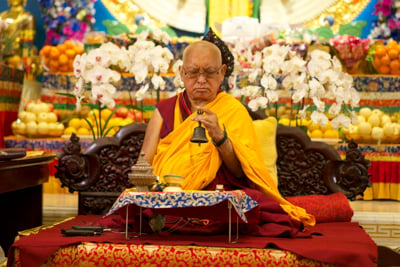 Lama Zopa Rinpoche continues to offer prayers and pujas to help people who are sick and stop the spread of COVID-19 and for the benefit of beings who are affected by it. Rinpoche has offered a collection of mantras and prayers to recite in response to the coronavirus pandemic that you can find here. FPMT International office will continue to update the page as more advice and resources become available.
Lama Zopa Rinpoche continues to offer prayers and pujas to help people who are sick and stop the spread of COVID-19 and for the benefit of beings who are affected by it. Rinpoche has offered a collection of mantras and prayers to recite in response to the coronavirus pandemic that you can find here. FPMT International office will continue to update the page as more advice and resources become available.
Big love,

Nick Ribush
Director
THIS MONTH'S TEACHING: Sangha is us helping each other
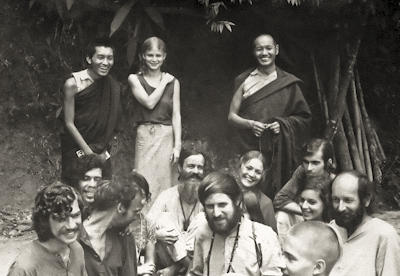 Why take refuge in Buddhadharma? Buddha means “opened” in the Sanskrit language, totally opened. A mind that is totally opened, having universal understanding, embracing universal reality. You can say “opened”—that you can call buddha. Maybe you are already a buddha. It is only a word. Of course, we have a philosophic, scientific explanation of the meaning of buddha, but I’m talking about it in a simple way. Buddha means opened mind, rather than closed tight, or wrapped up in a confused way. That’s why the Buddhist point of view is that all of us have got problems; we have small thoughts, wrong conceptions, tightness, bondage, superstition. But we also have the capability to cut all these things and be totally open, to become a buddha. To unify with buddha is within our capacity; we do have buddha potential. That’s why you shouldn’t think buddha is something foreign, don’t think that way; buddha is completely developed method—great love, bodhicitta, whatever—and great wisdom. Then you become a buddha. That’s all; it’s very simple. Don’t think in terms of language, don’t think of buddha in that language; you can call buddha something in your own language. What would you call it? Maybe Mickey Mouse. When you become a buddha, you become Mickey Mouse. Or maybe I shouldn’t say that. Sorry!
Why take refuge in Buddhadharma? Buddha means “opened” in the Sanskrit language, totally opened. A mind that is totally opened, having universal understanding, embracing universal reality. You can say “opened”—that you can call buddha. Maybe you are already a buddha. It is only a word. Of course, we have a philosophic, scientific explanation of the meaning of buddha, but I’m talking about it in a simple way. Buddha means opened mind, rather than closed tight, or wrapped up in a confused way. That’s why the Buddhist point of view is that all of us have got problems; we have small thoughts, wrong conceptions, tightness, bondage, superstition. But we also have the capability to cut all these things and be totally open, to become a buddha. To unify with buddha is within our capacity; we do have buddha potential. That’s why you shouldn’t think buddha is something foreign, don’t think that way; buddha is completely developed method—great love, bodhicitta, whatever—and great wisdom. Then you become a buddha. That’s all; it’s very simple. Don’t think in terms of language, don’t think of buddha in that language; you can call buddha something in your own language. What would you call it? Maybe Mickey Mouse. When you become a buddha, you become Mickey Mouse. Or maybe I shouldn’t say that. Sorry!
So, you understand, language is a problem: we are so oriented to dualistic concepts. Whenever I say an Eastern word you pull a face. Language is terrible; language makes a double wall for you—somehow buddha means a completely developed human being; that is buddha. That’s all, that’s all.
Dharma is the wisdom, the way to become a buddha, the way to liberation. Liberation from what? From human problems, human conflict, ego problems, attachment problems, hatred problems, desire problems, ignorance problems—liberated from these. So, Dharma is the way to liberate yourself from the difficulty of the three poisons.
Sangha are those who help each other. Maybe you can say we are Sangha. We try—I mean well when I try to talk to you; I hope I can help you. Maybe I’m your Sangha. Alright! So Sangha is us helping each other, acting together for the graduated path to enlightenment. We try to help each other, we mean well. Anyone who helps you to became more clean-clear, more realized, more satisfied—not superficial, worldly satisfaction, but some deeper satisfaction, more solid, more stable, more lasting—through wisdom and pure love, that kind of human being is Sangha. That can be a lady or gentleman, or anything. Sangha does not mean only those who have taken monk’s or nun’s vows—all of us are Sangha. Most of you Western people are couples, and a couple can be Sangha. A wife and husband can be Sangha, can really help each other—they can temporally help each other and ultimately help each other. We all need help for temporary adjustment in life, we need help emotionally and we need to give ultimate help to each other—we do need it, you know. We have emotions, so we need to somehow take care so we are emotionally stable, and we need to develop some kind of true great loving kindness and great wisdom.
Anyone around you who can do that is Sangha—that is your Sangha. That is not necessarily only a Buddhist. If you go back to a Christian priest and he helps your development of loving kindness and wisdom, he is also Sangha, even though he has a philosophically different religion. But as long as he helps you practically, he’s your Sangha. It’s true! Why do we need a helper? It depends—we don’t always need somebody who helps us to be right in front of us and we don’t always need relative Sangha—but while we are beginners we need somebody’s support, somebody’s help. When we are developed and have total confidence, we don’t need external Sangha or helpers; we don’t need an external guru—we can go completely inside, totally inside, like Milarepa. That’s a good example—Milarepa went alone into the mountains; he didn’t have any friends. Similarly, you can stay in your society and have good friends, but you don’t need “blah, blah,” friends.
You can see, in the West people desperately need a friend and yet the friend brings us down. What is really happening? Instead of being helpful to us, by being a friend they bring us down, make us irritated, increase our hatred and increase our agitation. That is not Sangha. “Sorry, I’m not helping you, you’re not helping me; when I helped you, you hurt me,”—that’s not right. You can say, “I have compassion for you, but I can’t help you; I’m sad, so goodbye,”—that’s a little better. If you hurt other people, it’s no good. Alright! So now you understand clean-clearly that taking refuge in Buddhadharma is so simple. You see, to take refuge in Buddhadharma you don’t need to say one word of an Eastern language; you don’t need to say one Western word—it’s just a way of understanding and an experience, that’s all. In Eastern countries, like Thailand or Tibet, people perform the taking of refuge; it’s the custom. Buddhism went into the culture, so people come together and recite [the refuge prayer].
Lama Yeshe gave this teaching during the Sixteenth Kopan Meditation Course held at Kopan Monastery, Nepal, in November–December 1983. This was one of Lama's last teachings before he passed away in March 1984. Edited by Uldis Balodis. You can find the whole teaching here on our website.
























